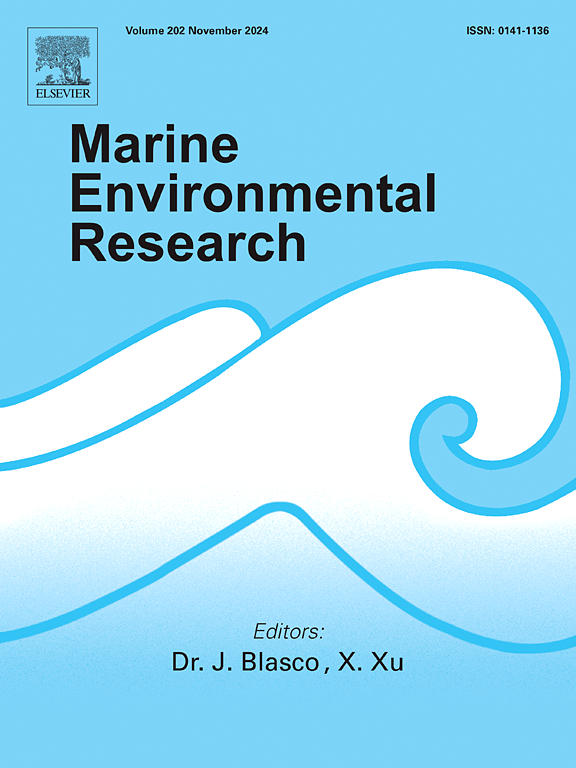Nitrate enrichment exacerbates microbiome and metabolism disturbances of the coral holobiont under heat stress
IF 3
3区 环境科学与生态学
Q2 ENVIRONMENTAL SCIENCES
引用次数: 0
Abstract
Coral reef ecosystems are facing severe deterioration due to escalating global temperatures and human-induced activities. Combined nitrate and heat stress can exacerbate coral bleaching, however, the underlying mechanism is still unclear. In the present study, we assessed the bleaching status of Acropora hyacinthus, a reef-building coral species, under high temperature and nitrate stress conditions using chemostat cultivation. We observed nitrate enrichment (9 μM) induced a significant reduction in photosystem efficiency (Fv/Fm) of Symbiodiniaceae and an increased thermal bleaching of corals under high temperature (30 °C). Nitrate exposure promoted the proliferation of Enterobacteriaceae and Vibrionaceae, which are bacterial families, potentially augmenting the coral's susceptibility to disease while exerting negligible effects on the fungal community. Alterations were observed in the metabolic pathways of both the coral hosts and Symbiodiniaceae, including down-regulated folate biosynthesis and inflammatory mediator regulation of TRP channels. Our findings indicate that nitrate enrichment under heat stress disrupts the metabolism of coral holobionts through altering bacterial communities, ultimately leading to increased coral bleaching.

硝酸盐的富集加剧了热应激下珊瑚全息生物的微生物群和代谢紊乱
由于全球气温上升和人类活动,珊瑚礁生态系统正面临严重恶化。硝酸盐和热应激的结合会加剧珊瑚白化,然而,潜在的机制尚不清楚。本研究采用恒化培养的方法,研究了建礁珊瑚Acropora hyacinthus在高温和硝酸盐胁迫条件下的白化状况。我们观察到,在高温(30°C)下,硝酸盐浓度(9 μM)显著降低了共生菌科的光系统效率(Fv/Fm),增加了珊瑚的热白化。硝酸盐暴露促进肠杆菌科和弧菌科细菌的增殖,这可能会增加珊瑚对疾病的易感性,而对真菌群落的影响可以忽略不计。珊瑚宿主和共生体科的代谢途径都发生了变化,包括叶酸生物合成的下调和TRP通道的炎症介质调节。我们的研究结果表明,热应激下硝酸盐的富集通过改变细菌群落破坏了珊瑚全息生物的代谢,最终导致珊瑚白化加剧。
本文章由计算机程序翻译,如有差异,请以英文原文为准。
求助全文
约1分钟内获得全文
求助全文
来源期刊

Marine environmental research
环境科学-毒理学
CiteScore
5.90
自引率
3.00%
发文量
217
审稿时长
46 days
期刊介绍:
Marine Environmental Research publishes original research papers on chemical, physical, and biological interactions in the oceans and coastal waters. The journal serves as a forum for new information on biology, chemistry, and toxicology and syntheses that advance understanding of marine environmental processes.
Submission of multidisciplinary studies is encouraged. Studies that utilize experimental approaches to clarify the roles of anthropogenic and natural causes of changes in marine ecosystems are especially welcome, as are those studies that represent new developments of a theoretical or conceptual aspect of marine science. All papers published in this journal are reviewed by qualified peers prior to acceptance and publication. Examples of topics considered to be appropriate for the journal include, but are not limited to, the following:
– The extent, persistence, and consequences of change and the recovery from such change in natural marine systems
– The biochemical, physiological, and ecological consequences of contaminants to marine organisms and ecosystems
– The biogeochemistry of naturally occurring and anthropogenic substances
– Models that describe and predict the above processes
– Monitoring studies, to the extent that their results provide new information on functional processes
– Methodological papers describing improved quantitative techniques for the marine sciences.
 求助内容:
求助内容: 应助结果提醒方式:
应助结果提醒方式:


